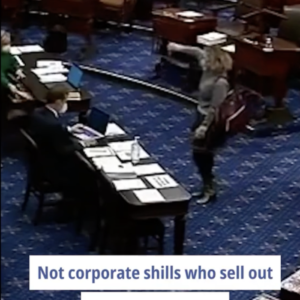No one has to tell you at this point that Republican obstructionism in the Senate is probably the biggest impediment to the ability of Congressional Democrats to implement a progressive agenda. And I’m equally sure nobody has to tell you that the filibuster has been the single most frustrating weapon in the arsenal of the Republican obstructionists.
So it won’t surprise you that when Congressman Barney Frank was asked recently what ought to top the progressive agenda going forward, he replied that it ought to be getting every Democratic Senator to sign on to restricting the filibuster, as you can see in the video above.
As you know, the filibuster and the need it creates to find 60 votes in the Senate is the reason we don’t have a public option in the new health care bill. It’s why we haven’t addressed climate change. It’s why a significant percentage of appointments to the Obama administration remain vacant, crippling the administration’s ability to do its job.
The clamor for change– and the American people’s frustration with its pace– is just starting to get traction inside the Capitol, where newer Senators like New Mexico’s Tom Udall are pointing out that despite the Constitution clearly giving each house of Congress the right to adopt its own rules of procedure, just a handful of today’s Senators have ever had the opportunity to actually vote on whether they want to continue working under the filibuster rule.
The opportunity to change that is coming, and momentum for it is growing every day. Senate precedents say that the beginning of each new Congress, the Senate has the opportunity to adopt or amend its rules by a simple majority vote, so January 2011 could be a real turning point. But organizing for such a big change needs to start now.
That’s why I’ve been pushing for the launch of an organized campaign toward this end, and why I’m so pleased that the Progressive Caucus Action Fund has created a fellowship program to help support efforts like this one and others aimed at bringing the netroots into a working partnership in moving our the progressive agenda forward in Congress.
Over the years, I’ve built something of a niche expertise in unraveling the mysteries of Congressional procedure for netroots activists and the wider blog-reading audience. And lately, we’ve been seeing the positive effects of informing an engaged community about the ins and outs of the rules and other mechanisms that make the Hill tick. The public option, declared dead at least half a dozen times over the past year, survived as a possibility nearly up to the last minute of the health care reform debate because we identified the pressure points that kept it alive. “Citizen whip counts” driven by a new and better understanding of voting dynamics helped apply needed pressure for passage of last year’s stimulus package. And when we discussed how the decision on renewing Joe Lieberman’s committee gavel would go through the previously obscure Senate Democratic Steering & Outreach Committee, members heard in unprecedented numbers from thousands of you on a process normally conducted entirely behind closed doors.
We’d all agree that an informed citizenry is an empowered one. It’s something we accept as an axiom when it comes to knowledge of the issues. But the same and more goes for Congressional procedure. It’s something that’s generally been shrouded in mystery for most people (and don’t think Members of Congress don’t sometimes like it that way), yet its critical not only to understanding why things on the Hill happen the way they do, but also to explaining why high-priced professional lobbyists tend to get their way so much more often than the millions of ordinary citizens who tend to want… something different. Getting what we want means understanding how to get it. Not just in terms of emails and phone calls, but in the mechanical terms of draft legislation, committee markups and floor procedure. There’s a good reason why Congressman John Dingell of Michigan– the longest-serving Member in the history of the House of Representatives– once said, “Let me control the procedure and I’ll never lose.”
So that’s what this is all about. More than just the filibuster, though that’s where we’re starting. If you choose, we can make this a long-running project aimed at increasing our leverage in Congress over a broad range of issues. Not just with my help, but potentially with the help of many more dedicated activists who can put their time, energy and expertise to work for all of us.
What are we asking you to do? For starters, how about joining in our filibuster reform petition effort, sponsored by CREDO Action? By sigining on, you’re also signing up to receive CREDO Action’s alert e-mails, so you can stay on top of the latest hot topics that need your attention on the Hill and elsewhere in the government. Is it a list-building exercise? You bet it is. But the good news is that for every name we add to that list, CREDO Action makes a generous donation to the fellowship program.
And if you’re in a position to do more and help us with a direct donation, we’ve got an ActBlue page set up for that, too. We’ll try and make this as transparent as we can.
So if you felt like you were well-served with good procedural information during the health care reform debate, and want to see our ability to build that kind of knowledge continue to grow, think about pitching in with us and making it happen. I’d appreciate it, and I hope you will too!








Comments